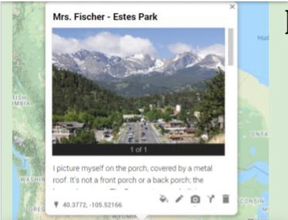 This is the latest in a series of blogs by partners of the Fluency work. -- By Kristen Fischer In this time of remote learning, as I sit in my empty classroom, heavily beige and completely windowless, it strikes me that I could really be sitting anywhere. Likewise, so could my students. Where would I like to be, if geography, travel, and other factors were not an issue? If I had no restrictions or obligations otherwise? Where would I go if I could teach from anywhere? I allowed my mind to wander on this topic for a while, and realized that my choice—shared and justified—revealed a lot about me. Likewise, I predicted I could learn a good bit about my students by asking them that question: Where would you choose to learn from, if you could be learning from anywhere? So, I decided to ask my incoming 11th grade American Literature students that question as our opening writing activity. There was one more thing, though—I didn’t want to be the only audience for their thoughts. I wanted to be able to collect all of our answers on a map that all students could then access. I pictured a map full of pins and the option to click on any one of them to learn about the person who put it there and why. With the help of Jess Kaminsky, I figured out how to make it happen with a Google Map; now, I have a map with an array of student posts, each with some media like a picture. And, not only have I learned about the students’ learning preferences and favorite places, but they have connected with each other in this way, too. The final part of the assignment involved reflecting on the map after browsing the pins and posts. Students recognized the quirky thinkers who want to learn from a zoo, and the introverts who want to learn in the mountains—or from the top of one; students recognized the beach-lovers, who want the white noise of the waves and warmth of the sand, and the adventurers, who want to work by day but hike glaciers or watch the aurora borealis by night. Teaching remotely has presented no shortage of challenges, constraints, and disappointments; lots of outcomes have fallen short of my visions and what used to be easy (showing a dvd! performing scenes from a play! jigsaws!) present unexpected and sometimes bewildering difficulties. However, in some cases, I’ve created activities and adapted assignments that I’m really happy with—activities and assignments that are better than their predecessors, and only emerged due to this unique set of circumstances. It’s these successes that are more important than ever to recognize, and reflecting on this one reinforces to me the value of learning opportunities rooted in authentic experiences and authentic questions. Sometimes, the debates I’m having in my head or the questions I’m asking myself are great inspiration for classroom inquiry. Kristen Fischer teaches English (and electives including Photojournalism) at Carlynton Junior-Senior High School in Carnegie, Pennsylvania, where she also coaches track & field, especially triple jumpers. She is a graduate of Clarion University and Georgetown University, and a member of Cohort 1 of the Fluency Project. She enjoys biking and hiking, especially when joined by her husband and three kids.
3 Comments
Laura Roop
9/28/2020 10:51:00 am
Kristen, I love this! It reminds me a little of an informal version of #WriteAcrossAmerica, that NWP Virtual Writing Marathon, but modified and adapted for the circumstances.
Reply
Kristen Fischer
10/5/2020 02:37:19 pm
Thank you—yes, I think I came up with this assignment while participating in one of those #writeacrossamerica sessions, actually. I liked the map-as-springboard concept a lot.
Reply
10/7/2022 09:10:59 am
Another see performance break player.
Reply
Leave a Reply. |
Archives
October 2020
Categories |

This work is licensed under a Creative Commons Attribution-NonCommercial-ShareAlike 4.0 International License.
 RSS Feed
RSS Feed